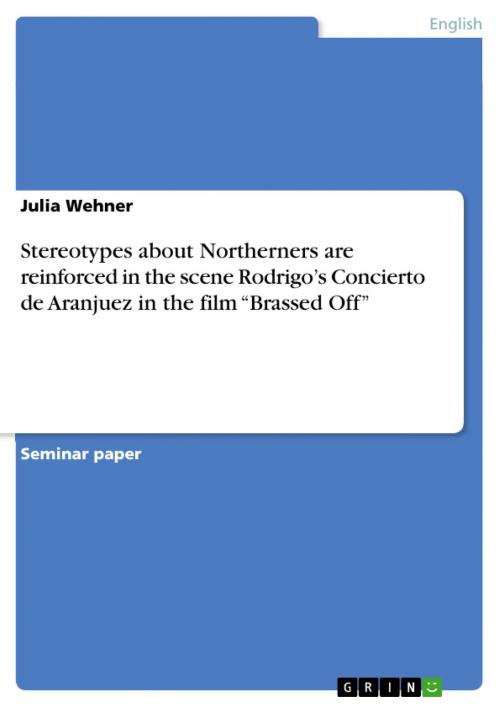Stereotypes about Northerners are reinforced in the scene Rodrigo's Concierto de Aranjuez in the film 'Brassed Off'
Nonfiction, Reference & Language, Study Aids, ESL, Foreign Languages| Author: | Julia Wehner | ISBN: | 9783656142874 |
| Publisher: | GRIN Verlag | Publication: | February 29, 2012 |
| Imprint: | GRIN Verlag | Language: | English |
| Author: | Julia Wehner |
| ISBN: | 9783656142874 |
| Publisher: | GRIN Verlag |
| Publication: | February 29, 2012 |
| Imprint: | GRIN Verlag |
| Language: | English |
Seminar paper from the year 2011 in the subject English Language and Literature Studies - Culture and Applied Geography, grade: 2,3, University of Duisburg-Essen, language: English, abstract: Stereotypes are human nature and can never be avoided completely. However, stereotypes about Northern England and Northerners seem to be particularly deep-rooted and longlasting. There is general agreement that they date from the 18th and 19th century when Northern England was the starting point of the Industrial Revolution (Jewell 2). 'When we speak of stereotyped characters we are dealing, in particular, with [...] traditions deriving from the effects of the Industrial Revolution' (Morris 9). The stereotypical 'Northerners' are working-class people, not well educated, and their lives are full of struggle and conflict. According to many preconceptions a male Northerner is unhealthy, badly dressed and frank about sex. Further cliché attributes are pragmatic, direct and even rude, but also downto- earth, passionate and heartily. Northerners feel alienated from the government in the 'centre' London and distinguish between 'us' and 'them' which creates to a strong sense of community. In today's pop culture these stereotypes are predominantly media-transmitted. By using a certain mode of presenting Northern English reality and its inhabitants stereotypes are rather reinforced than replaced in the media. Hence, there is a specific pattern used to reinforce stereotypes about Northern England and Northerners in films such as in the film 'Brassed off'. The most striking features that intensify these clichés in 'Brassed off' are setting, language, protagonists and 4 topics. All these characteristics can be found in the scene when the Grimley Colliery Band practices Rodrigo's 'Concierto de Aranjuez'; thus this scene reinforces stereotypes about Northern England to a large extent.
Seminar paper from the year 2011 in the subject English Language and Literature Studies - Culture and Applied Geography, grade: 2,3, University of Duisburg-Essen, language: English, abstract: Stereotypes are human nature and can never be avoided completely. However, stereotypes about Northern England and Northerners seem to be particularly deep-rooted and longlasting. There is general agreement that they date from the 18th and 19th century when Northern England was the starting point of the Industrial Revolution (Jewell 2). 'When we speak of stereotyped characters we are dealing, in particular, with [...] traditions deriving from the effects of the Industrial Revolution' (Morris 9). The stereotypical 'Northerners' are working-class people, not well educated, and their lives are full of struggle and conflict. According to many preconceptions a male Northerner is unhealthy, badly dressed and frank about sex. Further cliché attributes are pragmatic, direct and even rude, but also downto- earth, passionate and heartily. Northerners feel alienated from the government in the 'centre' London and distinguish between 'us' and 'them' which creates to a strong sense of community. In today's pop culture these stereotypes are predominantly media-transmitted. By using a certain mode of presenting Northern English reality and its inhabitants stereotypes are rather reinforced than replaced in the media. Hence, there is a specific pattern used to reinforce stereotypes about Northern England and Northerners in films such as in the film 'Brassed off'. The most striking features that intensify these clichés in 'Brassed off' are setting, language, protagonists and 4 topics. All these characteristics can be found in the scene when the Grimley Colliery Band practices Rodrigo's 'Concierto de Aranjuez'; thus this scene reinforces stereotypes about Northern England to a large extent.















